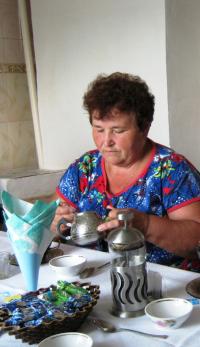It was the Novohradka village, we grew up there

Stáhnout obrázek
Jelena Ejchgorn, née Švihel(ová), is a Czech native from western Siberia. She was born in 1953 in Novohradka (Omsk region) in an ethnically mixed family; she had Czech, Ukrainian, and Latvian grandparents. In 1976 she married a local German and they had three children. She worked as a kindergarten teacher, later she was a labour union leader in the local sovchoz, and now she is retired. Czech was spoken at home most of the time. She remembers the Czech customs and songs which were once widespread in the village.
